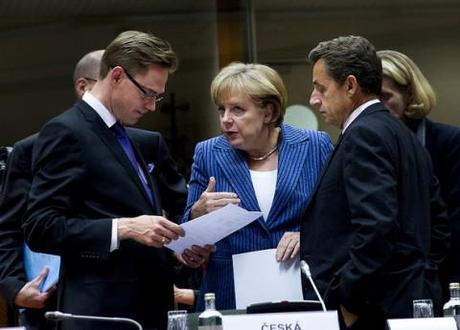
Angela Merkel (centre) and Nicolas Sarkozy (right). Photocredit: European Council http://www.flickr.com/photos/europeancouncil_meetings/5865957304/
Angela Merkel and Nicolas Sarkozy are to meet Monday to again attempt to thrash out joint proposals aimed at resolving the escalating eurozone debt crisis. The Franco-German meeting in Paris, France, kicks off a week of top-level pow-wows which culminate with an EU summit on Friday in Brussels, Belgium. The summit is being billed, by both politicians and commentators, as of crucial importance to the future of the beleaguered single currency project and comes as struggling eurozone countries Italy and Ireland prepare to roll out tighter austerity measures.
The BBC spelled out how the two countries’ positions differ: “Germany favours strict EU central control while France wishes to preserve more national sovereignty.” US Treasury Secretary Timothy Geithner’s presence in Europe this week for several meetings with leaders “is a measure of US concern that Europe’s woes could spread beyond the continent”, observed the BBC.
Merkel and Sarkozy have been working so closely in recent weeks that commentators have taken to calling the two Merkozy.
Germany calling all the shots. The BBC’s Stephanie Flanders argued that, “the momentum has all been Germany’s way” and that the “brutal subtext is that France does not have freedom of action right now; it just has to do what Germany says.” Flanders said there won’t be any meaningful progress this week until Germany, which has tended to move last throughout the unfolding crisis, plays its hand: “When France and Germany unveil their plans on Monday, the hope is that there will be enough new commitments from Germany – for example, to a more ambitious version of European bailout fund, the EFSF – to take the rescue plan to the next stage. Then, so the thinking goes, the IMF and the ECB will do their bit, and the euro will go on; stumble maybe, but not crash. Perhaps. But even this souped-up version of the ‘muddle through’ scenario requires some movement from Germany. We haven’t seen it yet.”
More fudge. Wolfgang Munchau in The Financial Times lamented that Merkel and Sarkozy “are as far apart as they ever were” and told readers to expect them to “fudge it yet again.” Munchau insisted that Sarkozy’s proposal “could not be more different” than Merkel’s “austerity club, a stability pack on steroids.” Given the marked differences of opinion, Munchau predicted little more than “another silly stability pact” will be achieved. “The way the negotiations are going now, I can see a compromise, but no solution,” lamented Munchau, who argued that no fiscal union will be achieved without a “political union and an eurobond.”
Two missing ingredients – and kick out Greece. Bill Emmott of The Times (£) argued that Chancellor Merkel’s “Thatcherite” stability union “won’t end the eurozone crisis.” Emmott noted that the stability union “the Germans are pushing for will take years to establish” and “even if” all 17 euro members say now that they agree to it, markets will have plenty of reason to worry that it might unravel during the real negotiations and when referendums are held in some member countries. In terms of dealing with today rather than tomorrow’s crisis, Emmott identified two “missing ingredients” – “a clear, sustainable distinction between the evidently insolvent Greece and the rest. Without that, investors will keep on requiring a ‘might soon be like Greece’ premium for Italian and other bonds. The second, previously an alternative, is some form of collective guarantee for sovereign debt of just the sort the Germans have fiercely opposed.” Turning to fixes, Emmott demanded that “Greece should be expelled from the euro, to show that the rules are genuine” and called for a new, time-limited, mutually guaranteed eurobond to be issued.
Winston Churchill was right about Europe. Writing a The Daily Mail’s Right Minds comment hub, Conservative MEP Daniel Hannan argued that if Merkozy want to “refound” Europe then Britain should go ahead and let them do it: “From Britain’s point of view, this ought to make the renegotiation simple. Instead of having to fight for every power that we want repatriated to Westminster, we can sit still and allow this ‘refoundation’ to go ahead without us.” Hannan appreciated that if “our allies are determined to keep it, we can’t stop them. But it is beyond belief that we should be investing, not just political capital, but actual capital in a currency that is worsening Europe’s economic crisis.” Backing Winston Churchill’s recommendations for Europe, Hannan suggested that Prime Minister David Cameron should back a “United States of Europe comprising France, Germany and their satellite countries. Britain would look on benignly, but would not participate.”

